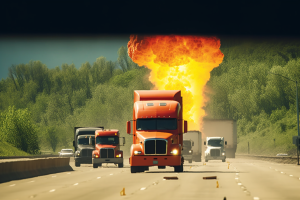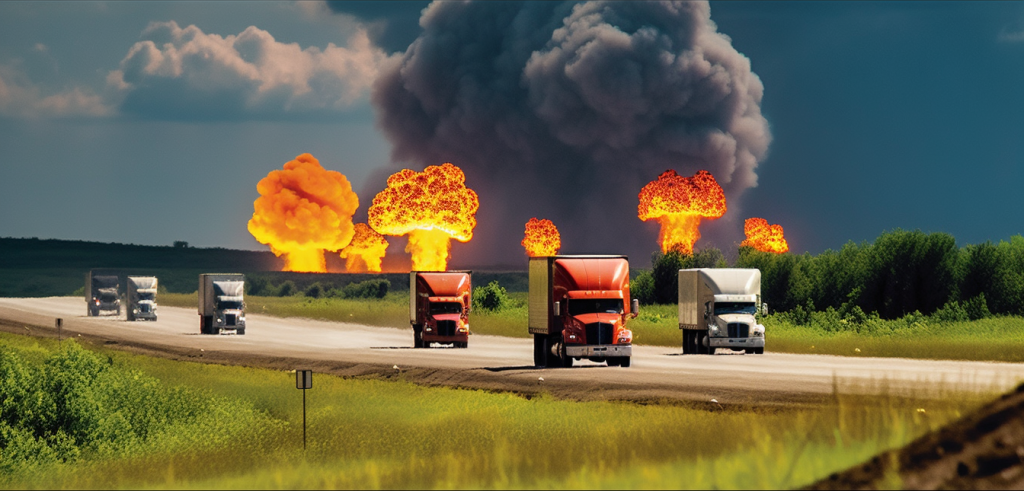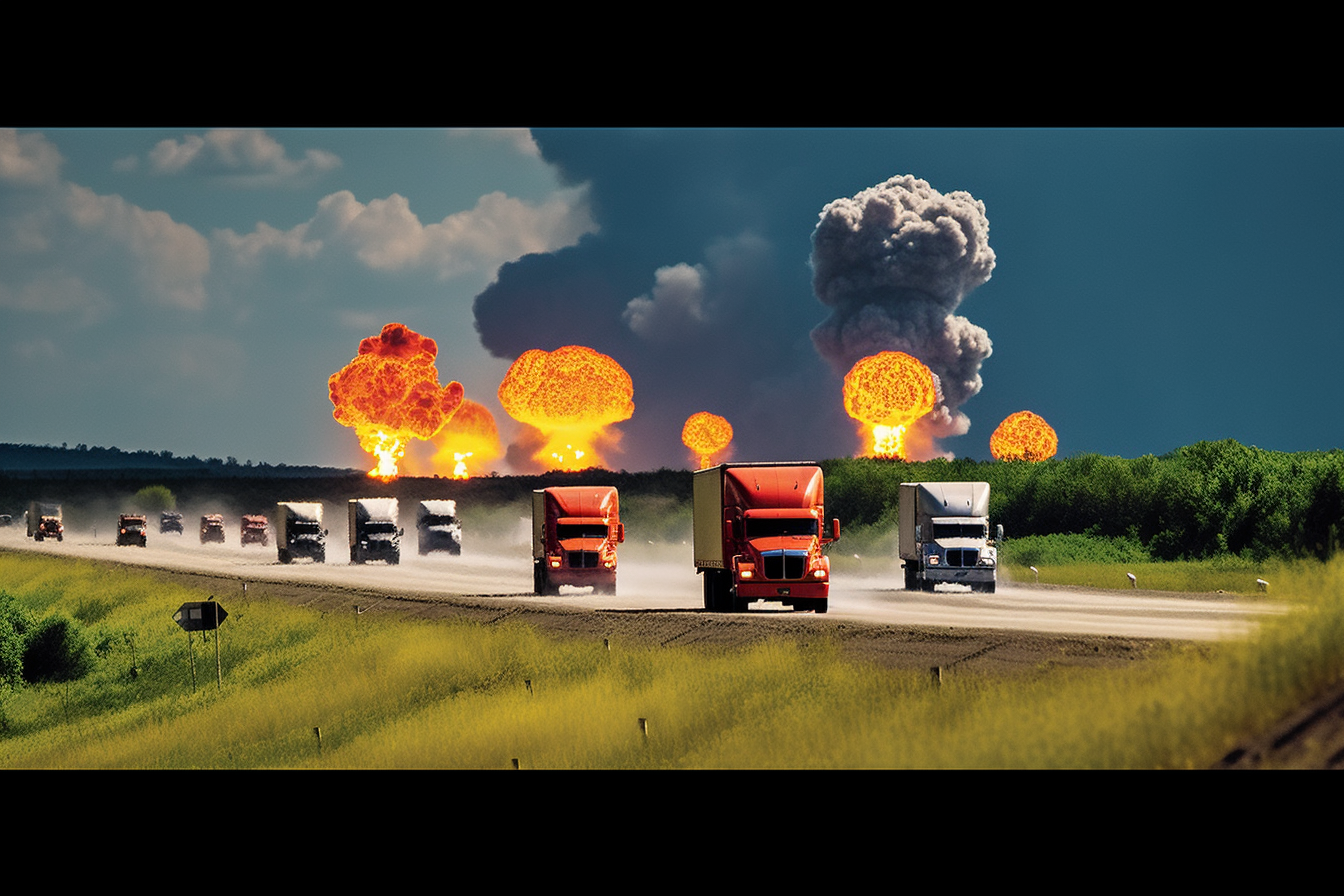2023’s Soaring Nuclear Verdicts: A Growing Threat to the Trucking Industry

Judgments exceeding $10 million against corporations have risen substantially, going from $4.9 billion in 2020 to $18.3 billion in 2022.
The trucking industry has experienced a dramatic surge in nuclear verdicts trucking judgments across the economy, causing significant concern for stakeholders. This increase in verdicts is putting immense pressure on transportation companies, leading to potential impacts on transportation costs that could ripple down the supply chain.
Marathon Strategies Highlights the Rise of Nuclear Verdicts
In an April 4 report, Marathon Strategies found that judgments exceeding $10 million against corporations have risen substantially, going from $4.9 billion in 2020 to $18.3 billion in 2022. The trucking industry has been hit the hardest, with the total sum awarded by juries increasing from $10.3 million in 2020 to $65.4 million in 2022. This increase followed a brief slowdown as courts closed in response to the pandemic, with the total spiking to $1.82 billion in 2021.
Factors Driving the Increase in Nuclear Verdicts
Marathon Strategies’ chief executive, Phil Singer, believes that corporate mistrust among younger adults serving on juries, a lack of tort reform in many states, and an increase in negative media directed toward corporations are driving the general increase in nuclear verdicts. He also pointed out that in some cases, massive payouts might be deserved, for instance, when a company has committed particularly egregious acts.
Aggressive Plaintiffs’ Bar Tactics
“The other factors are some of the trial tactics that are being used,” Singer said. “So, there’s something called the reptile theory, where the plaintiff’s lawyers focus on emotional triggers to make their cases to juries as opposed to doing a very black-and-white analysis of the specific laws in question. There’s another tactic called anchoring, where they initially throw out a huge number so that it becomes anchored in the juror’s mind.”
Enjoying our insights?
Subscribe to our newsletter to keep up with the latest industry trends and developments.
Stay Informed
Todd Reiser, senior vice president at insurance brokerage provider Lockton Cos., believes that the aggressive plaintiffs’ bar is responsible for the significant verdicts and settlements involving transportation companies.

Corporate mistrust among younger adults serving on juries, a lack of tort reform in many states, and an increase in negative media directed toward corporations are driving the general increase in nuclear verdicts.
Impact on Transportation Costs
Reiser noted that the increase in these verdicts has prompted some insurers to significantly limit their participation in transportation, and in some cases, withdraw from the market. This could lead to increased transportation costs passed down the supply chain, affecting the wider economy.
Efforts Toward Tort Reform
Industry groups and other stakeholders have been working toward tort reform at the state level to counterbalance the effects of these nuclear verdicts. Lisa Paul, chief strategy officer for transportation at insurance brokerage Hub International, said that shippers contracting with transportation companies have made contractual liability particularly burdensome for transportation providers.
Contractual Liability Expansion

The aggressive plaintiffs’ bar is responsible for the significant verdicts and settlements involving transportation companies.
Paul noted that shipper agreements often set jurisdictions around states that haven’t enacted reforms that protect carriers. This is because lawsuits have become more aggressive in pursuing as many potential parties as possible, shifting the approach from vicarious liability to negligent contracting.
“I think right now the balance is more in favor of the shipper than the transportation company,” Paul said. “As [lawsuits] continue to increase, we’re continuing to see increasing demand by shippers to raise the limit for which the transportation provider would be responsible for contractually, and it continues to be an issue.”
Pressure on Transportation Companies
Transportation companies often feel like they cannot refuse these obligations and push back on the contract to propose a more favorable state jurisdiction. For example, Florida has passed a law providing sweeping reforms to its legal framework, aiming to curb frivolous lawsuits against trucking companies.

The increase in these verdicts has prompted some insurers to significantly limit their participation in transportation, and in some cases, withdraw from the market.
Shippers Push Liability onto Transportation Providers
“The shippers are just trying to push all of that liability down to the transportation provider,” Paul said. “That squeezes the transportation company in between the nuclear verdict and then ultimately defending the shipper even beyond their public liability limit imposed upon them by the [Federal Motor Carrier Safety Administration]. So that’s where the squeeze comes in.”
Adapting to the Changing Landscape
In response to these challenges, transportation companies must adapt and find ways to mitigate the risks posed by nuclear verdicts trucking. This may include:
- Implementing stricter safety measures
- Investing in better training for drivers
- Exploring alternative insurance options

In response to these challenges, transportation companies must adapt and find ways to mitigate the risks posed by nuclear verdicts trucking.
Additionally, industry stakeholders must continue to push for tort reform on the state level and work together to address the issue of nuclear verdicts. By collaborating and addressing these challenges head-on, the trucking industry can better navigate this difficult landscape and continue to provide essential services to the economy.
Stay Informed on Trucking Industry News
For more news and updates on the trucking industry, including developments on nuclear verdicts and their impact on transportation companies, be sure to follow the latest news at TankTransport.com.
Remember, staying informed and proactive in addressing the challenges posed by nuclear verdicts is crucial for the continued success and growth of the trucking industry. With the right strategies and collaboration, the industry can overcome these obstacles and thrive in an ever-changing landscape.
News and Analysis of the Trucking Industry and its Key Players
Emerging Trucking Trends Shaping the Future of Transportation
More News on Transportation Insurance and Risk Management
External Resources
Federal Motor Carrier Safety Administration: Learn more about the federal agency responsible for regulating the trucking industry in the United States.
Marathon Strategies Official Website: Learn more about Marathon Strategies and their insights on nuclear verdicts in the trucking industry.




















